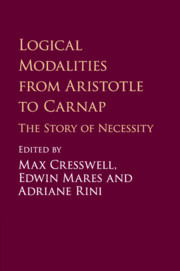Book contents
- Frontmatter
- Contents
- List of Figures and Tables
- List of Contributors
- List of Abbreviations
- Introduction
- 1 Aristotle on the Necessity of the Consequence
- 2 Aristotle on One- Sided Possibility
- 3 Why Does Aristotle Need a Modal Syllogistic?
- 4 Necessity, Possibility, and Determinism in Stoic Thought
- 5 Necessity in Avicenna and the Arabic Tradition
- 6 Modality without the Prior Analytics: Early Twelfth Century Accounts of Modal Propositions
- 7 Ockham and the Foundations of Modality in the Fourteenth Century
- 8 Theological and Scientific Applications of the Notion of Necessity in the Mediaeval and Early Modern Periods
- 9 Locke and the Problem of Necessity in Early Modern Philosophy
- 10 Leibniz's Theories of Necessity
- 11 Leibniz and the Lucky Proof
- 12 Divine Necessity and Kant's Modal Categories
- 13 Charles Sanders Peirce on Necessity
- 14 The Development of C. I. Lewis's Philosophy of Modal Logic
- 15 Carnap's Modal Predicate Logic
- Bibliography
- Index
14 - The Development of C. I. Lewis's Philosophy of Modal Logic
Published online by Cambridge University Press: 05 September 2016
- Frontmatter
- Contents
- List of Figures and Tables
- List of Contributors
- List of Abbreviations
- Introduction
- 1 Aristotle on the Necessity of the Consequence
- 2 Aristotle on One- Sided Possibility
- 3 Why Does Aristotle Need a Modal Syllogistic?
- 4 Necessity, Possibility, and Determinism in Stoic Thought
- 5 Necessity in Avicenna and the Arabic Tradition
- 6 Modality without the Prior Analytics: Early Twelfth Century Accounts of Modal Propositions
- 7 Ockham and the Foundations of Modality in the Fourteenth Century
- 8 Theological and Scientific Applications of the Notion of Necessity in the Mediaeval and Early Modern Periods
- 9 Locke and the Problem of Necessity in Early Modern Philosophy
- 10 Leibniz's Theories of Necessity
- 11 Leibniz and the Lucky Proof
- 12 Divine Necessity and Kant's Modal Categories
- 13 Charles Sanders Peirce on Necessity
- 14 The Development of C. I. Lewis's Philosophy of Modal Logic
- 15 Carnap's Modal Predicate Logic
- Bibliography
- Index
Summary
Introduction
C. I. Lewis is sometimes accused of taking a purely syntactic approach to logic. His favourite logics, S2 and S3, are sometimes claimed to be mere collections of axioms without representing any coherent notion of logical necessity, possibility, or deducibility (Anderson and Belnap, 1975, p 117). Lewis did, however, say a great deal about the meaning of the modal operators. In this chapter I examine what Lewis actually says about the modal operators and his philosophy of logic more generally and argue that there is much more to these systems, S2 and S3 in particular, than mere collections of axioms. I claim that certain of the features of these logics that are often criticized are in fact well motivated by his epistemological and semantical views.
I do not claim, however, that Lewis had a well-developed semantics of modality when he first put forward his logic of strict implication in 1911. Most of his remarks on semantical issues occur much later than that. Which, if any, of his later views he had in mind when he originally constructed his modal logic is impossible to tell. He does not make any remarks about this either in his published writings or (as far as I know) in the manuscripts in his Nachlass.
Moreover, his philosophical views changed, in some ways rather radically, over the course of his career. In his PhD thesis and his early philosophical writings, he is a Kantian idealist, but he adopts a form of pragmatism in the 1920s that has important consequences for his views about modality. In his more mature writings – especially in the 1940s and later – the influence of Kant is much less pronounced and his metaphysical views seem more realist. These more realist metaphysical views are reflected in his theory of meaning and his philosophy of logic.
We see Lewis's philosophy of logic develop along with his other philosophical views. In the 1910s, Lewis presented his modal logic largely as a response to classical logic. In the 1920s he provided an epistemological interpretation of modal logic. In the mid-1930s, he attempted to link his logic of strict implication with the notion of a tautology from Wittgenstein's Tractatus. In the 1940s, this connection took a more metaphysical and algebraic cast.
- Type
- Chapter
- Information
- Logical Modalities from Aristotle to CarnapThe Story of Necessity, pp. 279 - 297Publisher: Cambridge University PressPrint publication year: 2016



